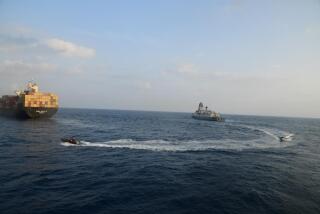Judge Upholds Seizure of Rocket Fuel Destined for Iran
- Share via
HOUSTON — In a major victory for the U.S. Customs Service, a federal judge ruled Tuesday that the agency acted properly in seizing 286,000 pounds of a rocket fuel ingredient that was secretly being sent to Iran.
At the same time, U.S. District Judge Sim Lake was highly critical of the way the Customs Service and the State Department handled their investigation of the case. He cited in particular the fact that more than a year elapsed between the seizure of the chemical aboard an Iranian freighter in the Dutch port of Rotterdam and the case’s arrival in his court.
The judge, who made his ruling after a two-day hearing, also stopped short of blaming the export company, Girindus Corp. of Tampa, Fla., for any attempt to hide the cargo’s true destination. He ruled only that the shipping documents stating that the chemical was bound for Europe were false and that proof of intent to violate the law is not required in forfeiture proceedings.
Girindus had asked Lake to order Customs to return the impounded cargo, but the agency, citing the inaccurate shipping papers, asked the court to declare it forfeit.
“We are delighted with the results of the case today,” said Customs spokeswoman Donna de la Torre. “We take our export enforcement program seriously.”
But David Laurain, the marketing manager for Girindus, said he was “flabbergasted” at Lake’s decision, especially since the judge had ruled in an earlier preliminary hearing that Customs agents had illegally seized the chemical.
“There was no false documentation,” he said. “It was strictly a clerical error.”
The case of the rocket fuel ingredient, ammonium perchlorate, has created a furor in Washington, where House Armed Services Committee Chairman Les Aspin (D-Wis.) went so far as to call it “a matter of grave national concern.”
At one point the controversy even caused the suspension of a $92-million loan from the National Aeronautics and Space Administration to the Nevada company that manufactured the rocket fuel, Pacific Engineering & Production Co. The loan was needed to rebuild a plant that was destroyed in an explosion last May, thereby creating a national shortage of the chemical. NASA reinstated the loan Tuesday.
During the hearing, it also came to light that two other cargoes of chemicals being shipped by Girindus had been impounded--one in Belgium and the other in Houston.
Laurain testified that he never knew of the 40,000-pound Belgian seizure, which occurred in 1987, until the confiscation of the Netherlands shipment in 1988. In both cases, the buyer was the same--D. A. Dampf, a West German chemical company.
Customs agents confiscated 240,000 pounds of the chemical in Houston soon after the impoundment in the Netherlands. That load was eventually shipped back to the manufacturer.
On the stand, and after the judge’s ruling, Laurain maintained his ignorance of the Belgian seizure, saying that Dampf had never informed him of what happened. Customs officials said they believed the Belgian shipment also had been on its way to Iran.
In a related development, C. Keith Rooker, an official with Pacific Engineering, said he had tried to call Dampf after learning from Girindus about the Belgian seizure for the first time last Saturday. He said he was told that the Dampf office was closed and that the company’s records had been seized by the West German government. Rooker said he was shocked to learn of the two apparent attempts to ship the fuel to Iran.
“If someone asked me to sell pencils to Iran--much less AP (ammonium perchlorate), I wouldn’t do it,” he said.
In the hearing, Customs officials contended that the seizure of the chemical was legitimate because Girindus had used two inaccurate shipping documents, one stating that the cargo was bound for Switzerland while another listed West Germany as the eventual destination.
An official with the freight forwarder that Girindus used to send the fuel to the Netherlands testified that he believed a clerical error in his office had caused the discrepancy. But the judge ruled that the ultimate consignee was neither of those two destinations, but Iran--and that Customs was therefore within its rights to seize the cargo.
He also ruled that on the date of seizure, the cargo did not belong to Girindus, but to Dampf. The judge said that if no one else claims ownership in 10 days, the rocket fuel component becomes the property of the Customs Service.
Kennedy reported from Houston and Houston reported from Washington.
More to Read
Sign up for Essential California
The most important California stories and recommendations in your inbox every morning.
You may occasionally receive promotional content from the Los Angeles Times.













